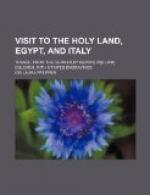All the exteriors seem in such good preservation, that one could almost fancy the knights had only departed to plant their victorious banner on the Holy Sepulchre. They have in truth departed—departed to a better home. Centuries have breathed upon their ashes, scattered in all the regions of the earth. But their deeds have been chronicled both in heaven and among men, and the heroes still live in the admiration of posterity.
The churches, the house of the governor, and many other buildings, are not nearly so well preserved inside as a first glance would lead us to imagine. The reason of this is that the upper part of the town is but thinly inhabited. A gloomy air of silence and vacancy reigns around. We could wander about every where without being stared at or annoyed by the vulgar and envious. Mr. Bartlett, the Englishman, made a few sketches in his drawing-book of some of the chief beauties, such as the Gothic gateways, the windows, balconies, etc., and no inhabitant came to disturb him.
The pavement in the city, and even in the streets around the fortifications, consists wholly of handsome slabs of stone, often of different colours, like mosaic, and in such good preservation that we could fancy the work had been but recently concluded. This is certainly partly owing to the fact that no loaded wagon ever crushes over these stones, for the use of vehicles is entirely unknown in these parts; every thing is carried by horses, asses, or camels.
Cannons dating from the time of the Genoese still stand upon the ramparts. The carriages of these guns are very clumsy, the wheels consisting of round discs without spokes.
From our tower of observation we can form a perfect estimate of the extent and strength of the fortifications. The city is completely surrounded by three lofty walls, which seem to have been calculated to last an eternity, for they still stand almost uninjured in all their glory. In some places images of the Virgin, of the size of life, are hewn out of the walls.
The neighbourhood of Rhodes is most charming, and almost resembles a park. Many country houses lie scattered throughout this natural garden. The vegetation is here no less luxuriant than in Smyrna.
The architecture of the houses already begins to assume a new character. Many dwellings have towers attached, and the roofs are flat, forming numerous terraces, which are all built of stone. Some streets in the lower part of the town, inhabited chiefly by Jews, are bordered with cannon-balls, and present a most peculiar appearance.
I was also much struck with the costumes worn by the country-people, who were dressed quite in the Swabian fashion. It was in vain that I inquired the reason of this circumstance. The books we had with us gave no information on the subject, and I could not ask the natives through my ignorance of their language.
By three o’clock in the afternoon we were once more on board, and an hour afterwards we sailed out into the open sea. To-day we saw nothing further, except a high and lengthened mountain-range on the Asiatic mainland. It was a branch of the Taurus. The highest peaks glistened like silver in the evening light, enveloped in a garment of snow.




